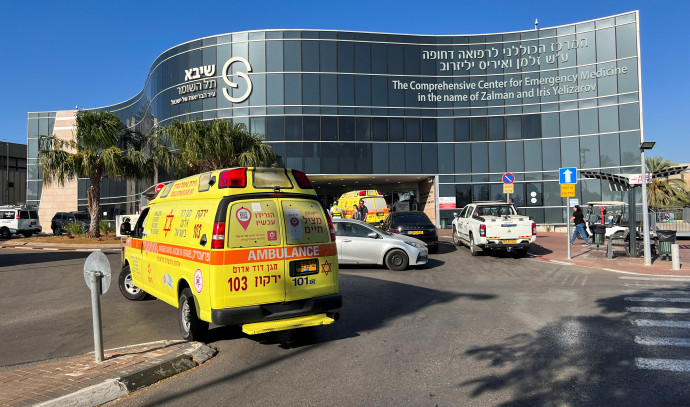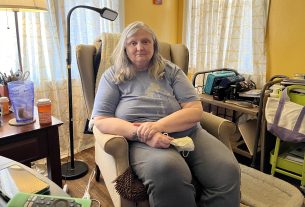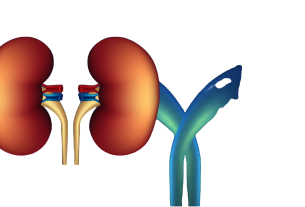For all Israelis, October 7, 2023 was a tragedy. But those who came into direct contact with the terrorists suffered untold horrors. The Golan family—Ellay, a doctor; Ariel, a social worker; and Yael, a 2-year-old in day care—lived in Kfar Aza, an Israeli village with around 800 residents a mile from the Gaza border, and one of the communities most affected by the Hamas assault. The family was severely burned by Hamas gunmen inside their own home. Ellay’s brother, Evyatar Hogeg, spoke of the atrocities to The Media Line.
“In the beginning, they talked about the bombing and shelling but very rapidly changed to gunfire and machine guns, so we knew there was an infiltration of a brutal terrorist attack there,” said Hogeg. “Around 1 pm, they sent us a gruesome, chilling message, saying: ‘Pray for us, we love you all, and goodbye,’” he continued.
The terrorists attempted several times to open the door to the bomb shelter in which the Golan family was hiding to slaughter them, as they did to many other civilians living at the kibbutz.
“They fought them so hard, and they managed to hold the door. I don’t know how they did it. The terrorists that took people outside started shooting them, yet they [my family] never went outside. So, the terrorists took a spare tire from the car, burned it, sent it into the house, and tried to smoke them out,” Hogeg narrated.
“They stayed there in that gruesome room, cooked alive and unable to breathe as long as they could, and they, I guess, took advantage of a short period of time. … We are not really sure, and they went out,” he added.
After escaping from their burning house, the young couple with their toddler managed to run from one spot to another until the kibbutz was finally liberated by the Israeli security forces. The family of three then arrived at Sheba Medical Center near Tel Aviv to receive urgent medical treatment.
“Unfortunately, the parents and the child got severe burns and are very critically ill. Thankfully, the child is getting better, she is improving. We woke her up, and she is communicating with her family,” Dr. Reut Kassif, the hospital’s pediatric intensive care consultant, told The Media Line.
“The baby [Yael] and my brother-in-law are doing better; they are waking up. My sister is still bad,” Hogeg noted.
Yael is being treated at the hospital’s Department of Pediatric Intensive Care, which has been moved to an underground parking lot to protect the children from Hamas’ constant rocket attacks.
20 critically ill patients moved to underground pediatric hospital
“We have about 20 critically ill patients that we moved down here to this sheltered, protected place when the war started so we can basically give the best care for critical patients during the war and during missile attacks,” Kassif noted.
Sheba is the largest hospital in Israel and the Middle East. In light of the war, the hospital has had to adapt itself to treat the injured from the October 7 terror attack and ensure that patients are safe while rockets continually fly overhead.
“The hospital is always busy, and we are always drilling for these types of situations, so we are not surprised,” Steve Waltz, international spokesperson for Sheba Medical Center, told The Media Line.
He added that although the hospital is always prepared, it is currently under pressure as it has been treating a lot of people who were badly injured. “Whether they are civilians or soldiers, or Jewish or Arab, it makes no difference because the terrorists didn’t distinguish,” Waltz added.
Since the start of the war, Sheba Medical Center has treated 319 wounded victims of Hamas’ attacks, 97 of whom and currently hospitalized, and 39 in Sheba’s rehabilitation center.
“As you know, there are still many kidnapped [Israeli] children back in Gaza, and I hope that when we get them discharged from the hostile Hamas, they will be in a good condition. But we are prepared for any scenario,” Kassif noted.
As Israel’s northern and southern borders are under attack, pregnant women from those areas are afraid to give birth in their local hospitals. Facing an overflow in its maternity ward, Sheba hospital found a way to release new mothers only 24 hours after giving birth so they could receive more patients.
Prof. Tzipi Strauss, head of Sheba’s Department of Neonatology, told The Media Line how they are managing to do so. “We go to each woman and baby, we also check on the baby at home, take all the blood tests and other things that are necessary, and then we have a doctor that reviews the results and tells them what to do,” she told The Media Line.
In these difficult times, Israelis have shown a spirit of resilience and goodwill to help their fellow citizens with donations, opening their homes, and even efforts to put smiles on the faces of those who are suffering.
Adar Cohen, one of the volunteers who sings regularly at Sheba hospital, told The Media Line that although her group arrives at the medical center every week, now, in times of war, their mission is more important than ever. “We are an amazing people, and we will come out of this,” she said.



